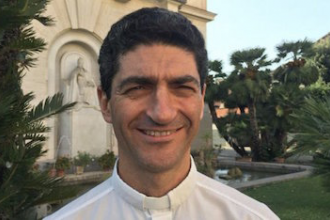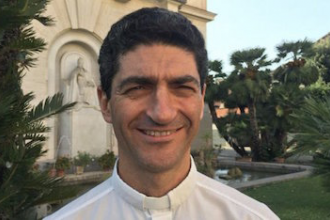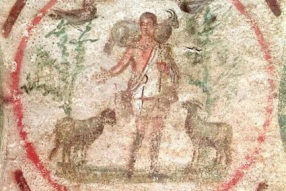Reflection on UN International Day of Peace

Fr Augusto Zampini Davies, an Argentinian priest attached to CAFOD, working for a PhD in theology and social ethics at Roehampton University, Preached on social justice on 21 September, International United Nations Day of Peace, at Holy Apostles, Pimlico.
The Psalm we read today says that 'The Lord is near to all who call upon him'. But is he? What about if you have worked hard to achieve something, you have even prayed for it, but you failed. Would you still believe that the Lord is near to you?
What if you work 12 hours a day to bring basic food to your family, you try hard to be honest and a good person, but next door is somebody who work far less hours than you, yet earning substantially more money.
How would people in slums in Africa feel when they watch TV and see our lifestyle? Would this inequality not challenge your faith that the Lord is near to all? Is God not closest to the better-off? Or what if you pray every day to the Lord, but precisely for that reason others want to kill you and your family, as it's happening in Iraq? Or when people in the name of God start to be aggressive and to declare war over others in the name of God? Is the Lord near to them? In all these circumstances, we may struggle to perceive the presence of The Lord. Where is He?
To clarify where God is truly present, and where can we really find him, Jesus speaks in parables about the Kingdom of God, a kingdom that is already here, among us, but needs stewards who can enhance it, that can live it to the point that others can feel the comforting presence of The Lord within our messy world.
The parable of The Workers in The Vineyard, although it is one of the most difficult parables to understand, is pivotal for the understanding of the Kingdom of God and of God's grace itself. Some Biblical experts define it the gospel in a nutshell, because it challenges our notion of justice, which is inextricably connected with our notion of peace and good relationships.
The parable is carefully framed in two scenes. In the first one (vv.1-7), the master of a house, or according to a more accurate translation: the manager in charge of the economy of the house, goes out to hire labourers for his vineyard. He goes out at different times of the day, but only agreed with the first workers for an average daily wage: one denarius. To the rest of the workers he will pay whatever is right or just. This is what generates great expectation. What would this 'right/just' reward be like?
In the second scene (vv.8-15), when the workers are paid, those who had worked only one hour are paid one denarius (the average daily wage), the same as the first workers. These workers, who had worked the entire day, were expecting to be treated with the same generosity as the last workers.
They were totally disappointed. For them, their payment was flagrant injustice, because the connection between work and reward was broken. They are upset, because the master of the house had made them equal to the rest. We listeners may also feel upset.
So the master clarifies the situation.
First, he asserts that there was no injustice whatsoever. If justice is to give to people what 'is theirs', what corresponds to them (vv.13-14a), then he has not wronged the first workers, who received their promised and well-deserved denarius.
Secondly, he addresses the feelings of the workers and our feelings, as listeners, with a direct question: 'why should you be envious because I am generous?' The master seems to be aware that being more than fair, that being generous with those in need, as was the case with the last workers, can provoke envy or jealously.
This suggests that giving to the last workers more than everybody had predicted was a good action, even though there was no proportion between the work done and the payment received. Conversely, the early-workers' protest about 'making them equal to the last-workers', although based on an idea of proportional justice, was wrong, because it was driven by envy.
In other words, the first workers' envious cry of indignation is not provoked by an unjust situation, but rather by a just one. These attitudes hinder social cohesion, without which it is impossible to live in peace.
In short, the parable implies at least two topical teachings. The first one is related with the UN day of peace. Living in peace, cannot be equated to the absence of conflict. Peace requires working in our attitudes towards others, especially those in need, and to combat our anger when people are generous or when others are treated as we are, even if we think they do not deserve it from a proportional-justice perspective.
To become actual peacemakers we need to work on our own selves, as well as on peace processes.
The second teaching is related to what happened recently in New York, at the UN headquarters, when leaders of countries and institutions of the whole world discussed the conditions for developing economically but in a sustainable way. For those who want to expand the Kingdom of God on earth, as the parable reveals, fighting against inequality is a must. Inequality foments social disruption and conflicts, which is the opposite of living in communion and peace.
Perhaps the fight is not so much against material inequality as such, but against inequality of opportunities, especially opportunities to live well, and to live in a non-polluted and healthy environment.
The raising of war and conflicts, and the increasing damage to the environment, is a warning for those who want to expand the Kingdom of God on earth. But it is also an invitation to work together, with people who, although different in character, have the same human dignity as us.
Together we can plan a way of living that does not requires the destruction of the Earth, and together, as equals, we can build up a world in which everybody can feel that The Lord is near to them.





















